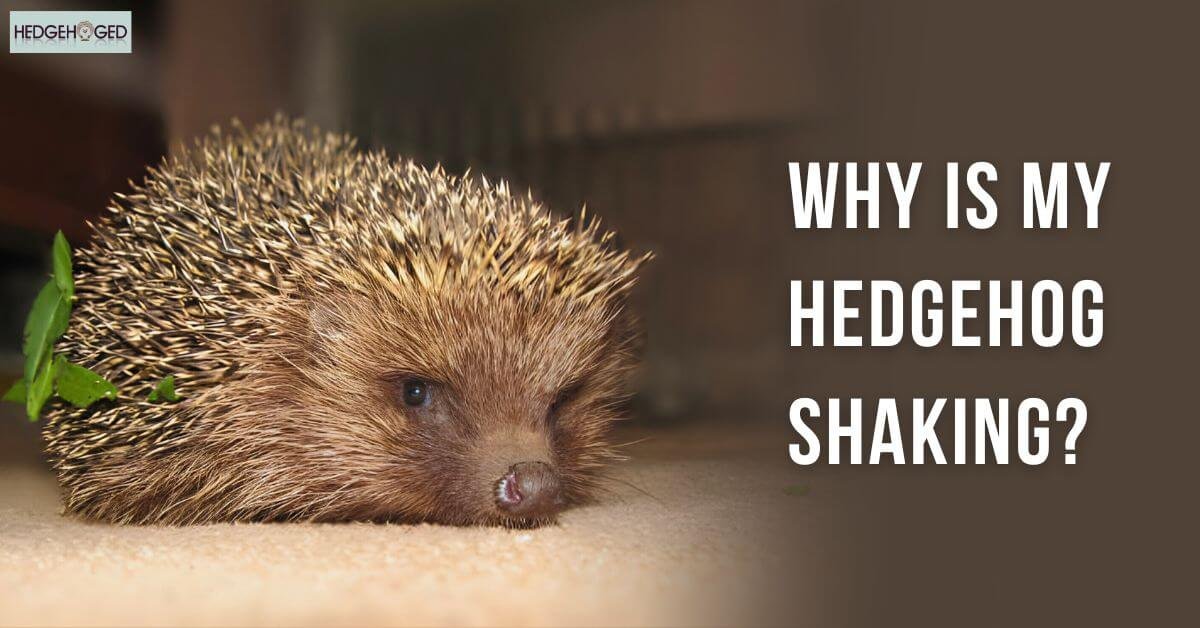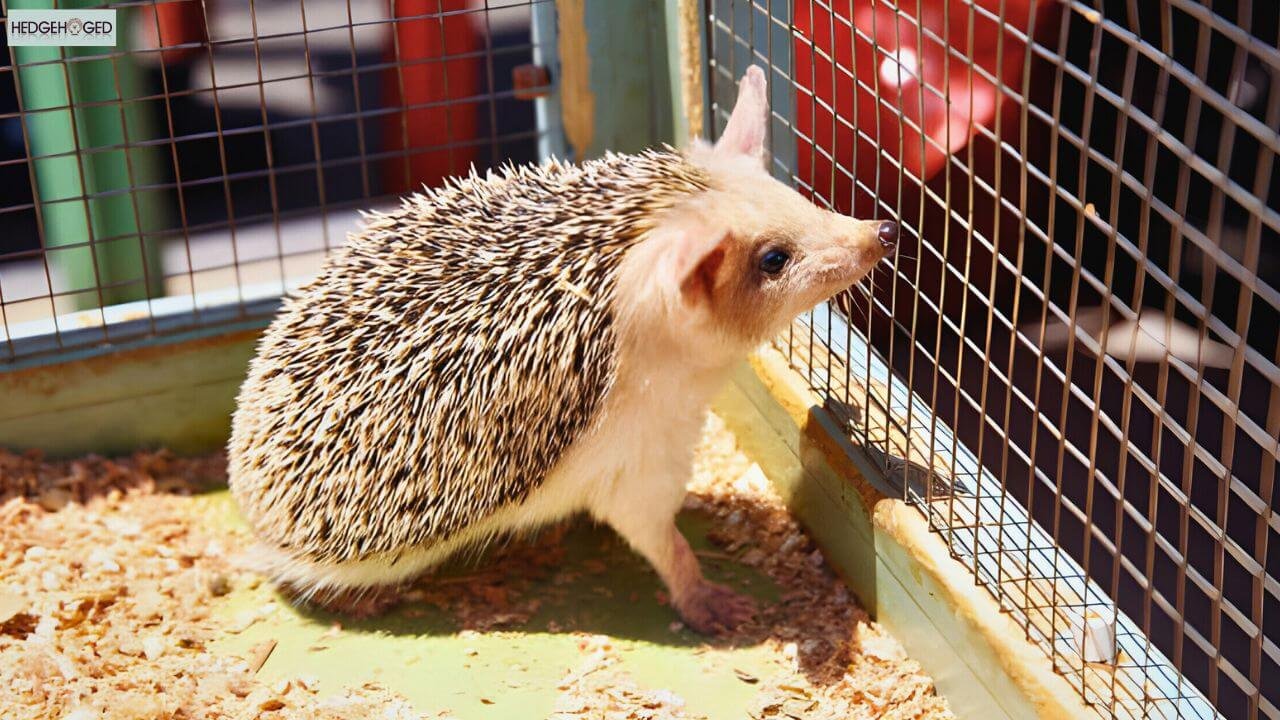Hedgehogs are charming yet thorny creatures and have intrigued us for centuries. Have you ever wondered about hedgehog shaking? It’s a question that captures our attention and provides us with the world of these fascinating animals.
It’s a common query that posts in the search Why Is My Hedgehog Shaking? Shaking in hedgehogs may be a negative indicator, even if the underlying cause is unclear. It doesn’t take a genius to see that the affected hedgehog may be in trouble, especially if there are other indicators of illness.
In this article, we’ll discuss the causes of the symptoms in hedgehogs and possible treatments. We also discuss a few techniques to avoid hedgehog vibrations in the initial time. Now let’s get going.
Why is My Hedgehog Shaking?
When exposed to cold weather, hedgehogs may tremble, which may eventually cause them to hibernate. In hedgehogs with Wobbly Hedgehog Syndrome (WHS), a degenerative condition for which there is no known treatment, vibrations are also frequently observed. If your hedgehog is trembling, don’t panic just yet; the underlying cause might be anything as simple as changing their habitat.
Causes of Hedgehog Shaking
Hedgehogs can shake for a variety of reasons, as was previously said, and understanding these causes can help you decide what to do. Let’s explore a few typical reasons why hedgehogs vibrate.
1. Hedgehogs in Cold Temperature
Hedgehogs may tremble when exposed to breezes or cold air in the winter because their bodies cannot adjust well to low temperatures. If you attempt to go outside during cold weather, shivering is a typical reaction when the body adjusts to cold temperatures. Hedgehogs have a similar experience.
The ideal temperature range for hedgehog cages is between 72 and 80 degrees Fahrenheit. If the temperature is below this range, it may cause problems. Another typical underlying cause of shivering hedgehogs is inadequate lighting since they need twelve hours of night followed by another twelve hours of light.
2. Stress and Wake-Up Stretching
Hedgehogs may shake due to anxiety in a manner analogous to how people tremble in response to severely frightening circumstances. Because they are little animals that in the wild are prey to larger ones, hedgehogs are prone to becoming frightened.
Have you observed that pet hedgehogs vibrate immediately after waking up at night? This might be related to bodily stretching, which humans and certain animals do shortly after getting out of bed. There’s no reason to panic if the shaking just happens when hedgehogs wake up.
3. Wobbly Hedgehog Syndrome (WHS)
WHS is a fatal degenerative illness that worsens with time and can cause hedgehogs to tremble. For afflicted hedgehogs, the neurological disorder is practically a death warrant because there is no known treatment. Unfortunately, WHS results from poor breeding techniques, such as inbreeding, and the genetic disorder manifests itself when hedgehogs reach 24 to 36 months of age.
WHS has been identified in a small number of hedgehogs as early as six months old. When hedgehogs exhibit trembling even in enclosures with constant warmth, availability of nutritious food, and appropriate sociability, it might be an indication of Wobbly Hedgehog Syndrome. After ruling out other prevalent concerns, they are taking the hedgehog to an exotic veterinarian.
It may result in a comprehensive examination and a definitive diagnosis. The only thing you can do to assist hedgehogs affected by WHS is to try to make their lives as comfortable as possible. Hopefully, a treatment is in the works to save hedgehogs from dying from the deadly illness in the future.
4. Lack of Nutrition
If you notice that your hedgehog losing weight, you should focus on the malnutrition of the hedgehog. Nutritional adequate food is very essential for hedgehogs. Malnutrition in its severe form can cause bodily vibrations in afflicted hedgehogs as the lack of critical nutrients takes its toll.
5. Hibernation Efforts
Shaking is frequently a sign before hedgehogs go into hibernation, which occurs when they are exposed to low temperatures for a long period. In the wild, hedgehogs hibernate during the winter months when food sources become few to preserve and the few resources available. Hedgehogs trying to hibernate may consume more than normal to enhance their fat reserves for survival during the long hibernation phase.
Even extremely active hedgehogs can become slow as a means of energy saving. Sleeping hedgehogs fall into torpor, a sleep-like condition in which metabolism is severely reduced to preserve energy. It is defined as complete or little food and water intake.
Tips to Calm Shaking Hedgehogs
Depending on the underlying cause, hedgehogs may stop shaking in a few different ways. Here are some methods in below:
Ensuring Warm Cage Conditions
Hedgehogs enjoy warm temperatures ranging from 75 to 80 degrees Fahrenheit. It keeps them within this range at all times and can help eliminate the unpleasant shaking indications. Fixing an automatic thermostat that is linked to the heating and cooling systems and activates when temperatures stray from the healthy range might save lives.
Additionally, warm weather may prevent hedgehogs from hibernating, which they are compelled to do when exposed to cold temperatures and which might be fatal. Raising your hedgehog’s temperature right away may be the best course of action if you think it’s trying to hibernate.
Contact with the skin is frequently a beneficial technique to gradually boost their temperatures. It prevents the hedgehogs’ systems from being shocked. It is a more effective alternative for heating pads, hair dryers, and hot water bottles. Physical contact, along with progressive heating of their cages. It should raise the hedgehog’s internal temperature and prevent hibernation efforts.
Watch the hedgehog’s response to resuscitation attempts and wrap it in a warm blanket as soon as recovery symptoms appear. When the hedgehog’s body temperature rises, it should gradually recuperate totally. To make certain that the hedgehog has indeed left the woods, keep a watch on it for at least the following 24 hours.
Balanced Nutrition for Hedgehogs
Providing adequate food is crucial to preventing malnourished hedgehogs from hibernating. If they have previously ignored their diet, now is the moment to set things right by paying great attention to what goes into their food bowls. Hedgehogs mostly eat professionally prepared hedgehog diets with the appropriate nutrients for each stage of their life, or well-balanced cat food.
For example, older hedgehogs can need less protein than younger ones, who need diets high in the essential ingredients for consistent growth. Supplementary foods like mealworms and roaches have to be included in a hedgehog’s diet as a pet. You should also add lean meats like chicken and eggs because these meals have health advantages.
Hedgehogs that were previously stunted in development begin to improve physically after balanced foods are introduced into their lives. More significantly, the shaking subsides rapidly.
Effective Socialization Methods
Hedgehogs shake a lot because they are afraid of what the future may bring, especially in unfamiliar places. Taking care of hedgehogs as pets daily and allowing them to become used to your smell might eventually dispel misunderstandings about your intentions. Though hedgehogs aren’t the friendliest pets around, don’t expect it to happen instantly. Being patient is essential as they require some time to acclimate to people.
Optimal Hedgehog Cage Setup
A hedgehog’s cage should be designed to be as near to its natural environment as possible, including basics such as cage litter for digging chances and hideouts that provide a sense of security when they feel attacked. Furthermore, having access to running wheels and other toys keeps their thoughts active, reducing boredom and improving their mood.
Domesticated hedgehogs are not walking 2 kilometers every night to locate food, but running wheels can more than compensate. Hedgehogs frequently use their wheels to run 10–12 kilometers every night once they wake up. We cannot overlook the need for adequate illumination in hedgehog cages, since these animals thrive on a 12-hour cycle of light and darkness.
Reducing Stress Triggers
The elimination of noise and other stressors may also reduce the chance of adverse effects such as shaking. Hedgehogs like peaceful places with low noise since they stress out easily, and it is the responsibility of every owner to keep them safe from unsettling sounds.
Q1. What makes a hedgehog tremble?
It is possible to look into disorders of the brain or spinal cord, vestibular (inner ear) issues, malnourishment, tumors, poisons, trauma, and other ailments as potential reasons.
Q2. Why does my hedgehog feel cold and wobbly?
The African Pygmy Hedgehog is afflicted with Wobbly Hedgehog Syndrome (WHS), a chronic and degenerative neurological condition. Genetics is thought to be the cause.
Q3. Can hedgehogs shiver?
They will shiver, but they will very certainly be running about furiously.
Q4. If my hedgehog refused to eat, what should I do?
If your hedgehog is not eating food and you experience weight loss, it can be due to shaking and an inappropriate diet. Hedgehogs can’t eat food because of these problems.
Q5. What symptoms of stress might a hedgehog display?
While many busy hedgehogs like to go exploring, a stressed-out hedgehog will be considerably more tenacious and unlikely to be sidetracked.
Conclusion
In conclusion, why is my hedgehog shaking? Potentially lethal conditions do not always cause hedgehog shaking, but the underlying causes should always be examined. Hedgehogs enjoy sleeping or completing the required preparations to ensure constant warmth. However, problems are unavoidable when hedgehogs shiver in an attempt to go to sleep or as a sign of Wobbly Hedgehog Syndrome.
Immediate action should be taken to avoid hibernation attempts, and do not hesitate to schedule a meeting if WHS is detected. Ensure that your hedgehog has access to a steady supply of healthy feed to promote development and prevent trembling caused by malnutrition.


